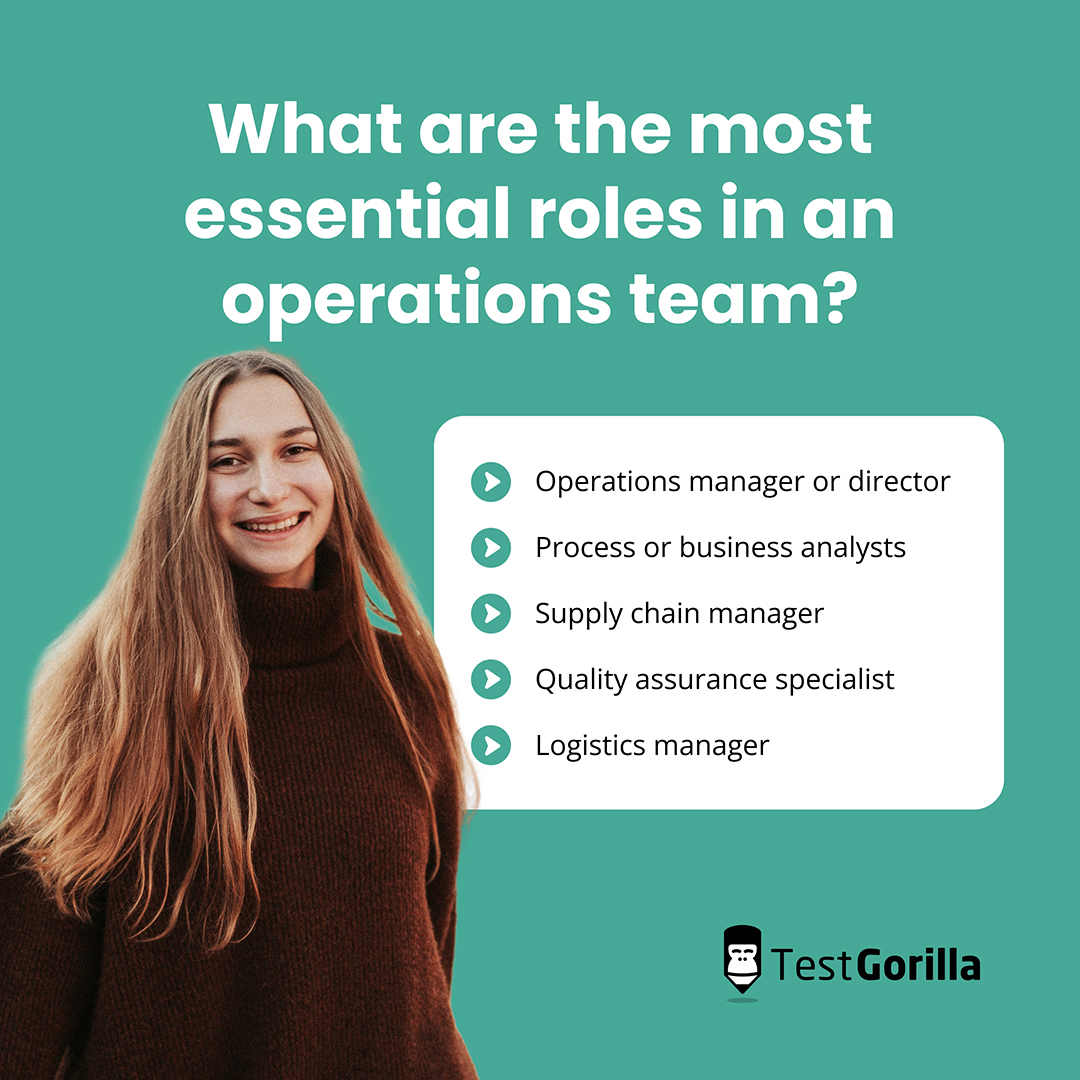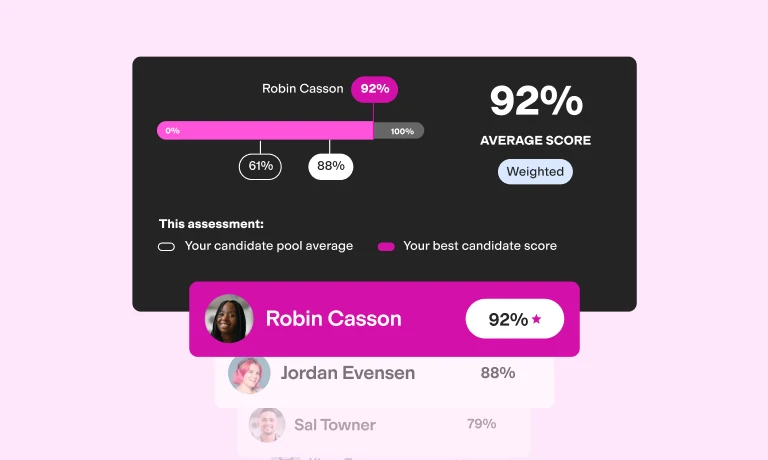Having a stellar operations team ensures your organization’s smooth functioning and efficiency. The task, however, extends beyond assembling a team of skilled individuals with impressive resumes.
If you want to build a team that regularly meets deadlines, delivers results quickly, and helps increase your business’ efficiency, you must streamline your hiring process.
With the right mix of skills assessment tools, efficient workflows, and strategic decisions on the structure and size of your operations function, you can hire a successful operations team in no time.
In this guide, we’ll help you structure your hiring process and select the right candidates for your organization. Here, you’ll find more information about:
What operations teams do
What are the essential roles you should look to fill
The top skills operations professionals need to have
How pre-employment skills testing can help you assess them objectively
With the right tools and strategy, hiring an entire operations team will be simple.
What do operations teams do?
Operations teams are the backbone of any organization, managing the relationships between various business functions to ensure seamless processes and optimal efficiency.
From supply chain management and logistics to project execution and resource allocation, a well-structured operations team is pivotal in helping an organization achieve its strategic objectives.
Here are some things that an operations team does:
Ensure process efficiency: Your operations team analyzes existing processes and workflows, identifies bottlenecks, and implements strategies to streamline operations.
Resource management: Operations teams are responsible for efficiently allocating resources, managing budgets, optimizing staffing levels, and ensuring the availability of necessary supplies.
Mitigates risks: Operations professionals conduct risk assessments to identify potential threats to the business and develop contingency plans to minimize disruptions and ensure business continuity. According to McKinsey & Company, risk mitigation is essential for developing resilience; for two thirds of surveyed executives, resilience was central to their strategic processes.
Quality assurance: Operations teams are responsible for quality control and ensuring that products or services meet predefined standards and adhere to industry regulations.
Logistics management: Operations teams also ensure end-to-end supply chain management, from procurement to distribution. To do this, they must coordinate with suppliers, optimize inventory levels, and oversee logistics operations.
What are the most essential roles in an operations team?
An operations team usually consists of individuals with diverse skills and expertise. Collectively, they work towards the seamless functioning of the organization.
Here’s a more detailed explanation of each essential role within an operations team:
Operations manager or director
Operations managers lead the operations team and oversee various operational processes. They provide direction, guidance, and support to enable each team member to do their best work – and ensure the team can meet its goals.
Their main duties are to:
Define the overarching operational strategy
Oversee the performance of operational processes and identify areas for improvement
Make strategic decisions to enhance efficiency and mitigate risks
Align the operational strategy with organizational goals
Looking to hire a director of operations? Check out the 7 essential skills for directors of operations and use our free director of operations job description template to get started.
Process or business analysts
Process or business analysts are responsible for examining and evaluating existing business processes within an organization.
Process analysts focus on processes, while business analysts usually look at the bigger picture to find ways to improve a business’ systems, workflows, and processes. In practice, the two roles often overlap, especially in smaller companies.
Their main responsibilities are to:
Analyze and document existing workflows
Conduct in-depth analyses of existing processes and systems
Identify inefficiencies and areas for optimization
Document findings and propose solutions
Collaborate with other team members to implement process improvements
Supply chain manager
Supply chain managers optimize inventories and manage relations with suppliers and wholesale clients. They’re an important part of an operations team responsible for maintaining a cost-effective supply chain. For this, they need to:
Optimize inventory levels to prevent shortages or excess
Negotiate contracts with suppliers and ensure a reliable supply of goods or services
Oversee logistics processes and ensure the smooth transportation of goods from suppliers to the organization to its customers
Quality assurance specialist
Product quality must be assessed thoroughly before it reaches customers. This is where a quality assurance specialist with the right QA skills becomes essential. Their primary responsibilities are to:
Ensure products or services meet quality standards through testing and inspection
Ensure products comply with industry regulations
Develop testing protocols and inspection procedures to maintain quality control
Identify opportunities for quality enhancement
Collaborate with other teams to implement improvements
Logistics manager
Logistics managers oversee every aspect of a company’s supply chain, from preparation to transportation to delivery. They ensure the company can deliver products to customers on time. For this, they need to:
Coordinate the movement of goods
Select the most efficient and cost-effective transportation methods
Develop strategies for efficient distribution and timely delivery
Optimize delivery routes to minimize costs and delivery time
The best insights on HR and recruitment, delivered to your inbox.
Biweekly updates. No spam. Unsubscribe any time.
Skills to look for when building an operations team
A strong operations team relies on the skills of its members. Here are the most important ones you should look for:
Communication
Effective communication is the glue that binds a team together.
Everyone on the operations team should be good at precisely communicating their ideas, instructions, reservations, and feedback. This is a must-have skill because it fosters a collaborative environment where everyone is on the same page and helps mitigate misunderstandings.
Adaptability
Every day is different for an operations team, making adaptability a prized skill.
According to the World Economic Forum, flexibility is among the top five skills of 2023. Indeed, flexible and adaptable professionals can seamlessly navigate through changing circumstances and find the best solutions.
Your operations team should be able to embrace new technologies, methodologies, or organizational structure shifts without difficulty. Your workers’ agility allows them to respond effectively to unforeseen challenges and ensures that operational processes aren’t hindered in the face of evolving circumstances.
Software proficiency
Technology has become an essential part of every industry. Technical proficiency in operations extends beyond general computer literacy or Microsoft Office skills (although those are important).
Your team should be familiar with specific software tools that streamline and enhance operational processes, such as:
Customer relationship management (CRM) tools such as HubSpot CRM, Salesforce, and Zoho CRM
Enterprise resource planning (ERP) systems such as SAP, Oracle, and Microsoft Dynamics
Project management tools like Asana, Trello, and Jira
Data analytics and visualization tools such as Tableau, Power BI, and Google Analytics
Leadership and people management
Leadership is a multifaceted skill essential in guiding operations teams toward success.
Besides directors and leaders, managers and team leads should also excel in team management, providing clear direction and motivating others to achieve organizational goals.
Developing efficient workflows and contributing to achieving key performance indicators is vital in an operations team.
So, look for candidates with excellent strategic thinking and business judgment. They’ll be instrumental in aligning operational processes with overarching organizational objectives.
Time management
The operation team is responsible for ensuring the timely delivery of goods and services and meeting deadlines without fail. This makes time management a critical skill for all operations professionals.
Look for candidates who can optimize their workdays and organize tasks methodically. They’ll be an asset to the organization and will closely monitor every aspect of your operational activities.
Effective time management also includes priority setting. This allows staff to distinguish between urgent and important tasks, allocating them wisely and maintaining a balanced workflow.
Attention to detail
Meticulous attention to detail is a deciding factor for flawless operations execution. An operations team oversees many different processes, so everyone must stay on top to ensure seamless management and execution.
Operations professionals with a keen eye for detail can easily spot discrepancies and ensure every aspect of their work is executed precisely and accurately.
From managing inventory levels to overseeing project timelines, individuals with keen attention to detail foster a culture of high quality within the team, leaving no room for oversight in complex operational processes
How to build a successful operations team: A step-by-step guide
A successful operations teams starts with the following steps:
1. Define the structure of your future operations team
This is one of the most critical steps in building your operations team. Not every company has the same requirements or budget, so the size of your operations team will depend on the business objectives and responsibilities.
Here’s what you need to do to form your own operations team:
Assess your operational needs
Set operational targets, focusing on KPIs and efficiency metrics
Calculate resources you can allocate to your operations team
Define key roles and responsibilities
Once this is done, you also need to define the team's hierarchy. The three most common structures for an operations team are:
The hub model
The hub model is a straightforward structure that centralizes operations functions. Each team member has a distinct role in this structure, often focusing on specific operational processes. The emphasis is on autonomy, fostering a competitive yet individualistic culture within the team.
The sequential workflow
In a sequential workflow, specialized teams handle different stages of the operations process sequentially. Each team completes its task before passing it on to the next, ensuring a streamlined workflow. Careful coordination is required in this structure to avoid bottlenecks and miscommunication.
The collaborative pod
Bringing together the hub and sequential model, the pod model features a specialized team working collaboratively on end-to-end operational processes. This hierarchy structure is best for large organizations aiming to scale operations.
2. Identify the roles for which you need to hire
Now that you have an idea of the structure of your team, it’s time to identify the roles you need to hire for.
Remember that for smaller businesses, only some roles require hiring full-time employees. Depending on the role and the size of your company, you may want to consider hiring freelancers as well.
Deciding who to hire depends on several factors, such as your:
Industry
Products or services offered
Company size
Budget
Competitors
Target market
By carefully considering these factors, you can strategically outline the roles necessary for your operations team, ensuring that each position contributes to your organization's overall efficiency, productivity, and success.
3. Source operations candidates
Next, begin the hiring process by sourcing qualified candidates. Here are some reliable sources you can explore to find your next hire:
LinkedIn: LinkedIn is one of the most popular professional networking platforms that connects you to a vast pool of global and local candidates
Indeed: This is a widely-used job board where you can post job openings and attract a diverse range of candidates
Monster: Monster is an online job portal that facilitates the recruitment process by connecting you with a broad spectrum of candidates and resumes
The ASCM Career Center: The Association for Supply Chain Management has a career center where you can hire supply chain and operations professionals
OperationsCrossing: You can use this niche job board focusing specifically on operations roles
TechCareers: Targeting the technology sector, TechCareers connects you with candidates who specialize in tech operations
4. Evaluate key operations skills for each role.
To build a successful operations team, you must have skills at the epicenter of the evaluation process. Resume screening alone is not enough to hire the right people; you need to assess their skills as well.
With TestGorilla, you can use pre-employment skills testing to build a skillful team capable of handling your business operations efficiently.
TestGorilla enables you to create a skills assessment by combining up to five skills tests. Here are some useful tests that you can include in the evaluation:
Business operations management: Evaluate applicants’ ability to plan, manage, and control operations.
Communication: Efficient communication is central to any operations team; with this test, you can easily evaluate candidates’ communication skills.
Time management: Identify applicants who can manage their time well and stick to deadlines.
HubSpot CRM: If you use HubSpot CRM, with this test, you can evaluate candidates’ proficiency in it.
Leadership and people management: Find strong leaders with the help of this test.
Supply chain fundamentals: If your business requires supply chain management skills, this test will help you find suitable candidates.
5. Ask the right operations interview questions
Once you identify your best candidates with the help of skills tests, it’s time to interview them. Here are some interview questions you can use when hiring an operations team:
Can you give an example of a successful project you managed?
What strategies do you use for effective inventory management?
How do you identify which processes need improvement?
Give me an example of a time you made significant changes to an existing process. What was your approach and what was the outcome?
Can you discuss a time when you had to negotiate delivery times and conditions with suppliers?
What are your strategies for managing cross-functional teams?
How do you forecast and plan for long-term operational needs?
6. Hire and onboard new employees
Now that you have plenty of information about each candidate, it’s time to decide whom to hire.
After hiring, you need to successfully onboard the employees as well. Onboarding is crucial because a bad experience can lead to people leaving the organization soon, especially if you’re hiring remote employees.
To provide a better onboarding experience, you can follow our onboarding checklist. This will help you make sure that new hires feel right at home and are motivated to work for your organization.
7. Use the right operations tools
Using modern technology and the right software can improve your overall operations process. These tools help you make the processes more efficient and help employees improve their productivity.
Some examples of top software tools for operations teams are:
Enterprise resource planning (ERP) software such as SAP and Oracle
Supply chain management software such as JDA Software and Blue Yonder
Customer relationship management (CRM) platforms like Salesforce and HubSpot CRM
Project management software such as Asana and Trello
Data analytics and business intelligence tools like Tableau and Power BI
Workflow automation software like Zapier and Automate.io
Communication and collaboration tools such as Slack and Microsoft Teams
Build the best operations team by structuring your hiring process
Hiring an effective operations team requires a strategic and comprehensive approach to recruitment.
By following the above steps and focussing on both the technical and soft skills of the candidates, you’ll be on your way to assembling an operations team that drives the success of your organization.
Resumes won’t give you the best hires – but pre-employment skills testing will.
Try TestGorilla for free today and start building the best operations team. To learn more about how TestGorilla can help you create the right assessments for your open roles, sign up for a free live demo with a member of our team.
You've scrolled this far
Why not try TestGorilla for free, and see what happens when you put skills first.



















